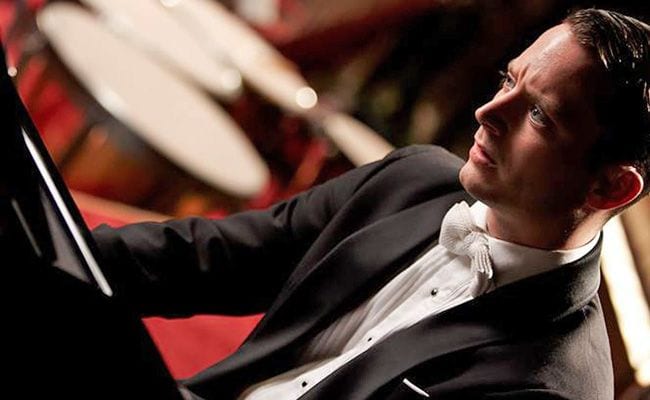
Elijah Wood could have played it safe. After starring in one of the most successful film franchises of all time, Peter Jackson’s take on J.R.R. Tolkien’s The Lord of the Rings, he could have continued down a purely commercial path, earning mainstream kudos and massive paychecks for staying well within his Q-rating comfort zone. Instead, the iconic actor has branched out, playing with his persona with such surreal choices as Kevin in Sin City, the title terror in the excellent Maniac remake, and as a substitute teacher battling killer kids in the upcoming horror comedy Cooties. He’s also spent the last three years as the human lead in the American remake of the Australian sitcom Wilfred, where he costars alongside a guy in a dog costume. A dog costume. Hardly the stuff of solid superstar support.
We can now add Grand Piano to the list, yet another quirky casting decision that keeps Mr. Wood from advancing among his fellow A-listers. In this obvious homage to suspense maestros past (Hitchcock, DePalma), present (Argento, Carpenter), and future (Umm…), filmmaker Eugenio Mira, in collaboration with screenwriter Damien Chazelle, comes up with as pretty clever premise. Wood is Tom Selznick, a once celebrated pianist who now suffers from a serious case of stage fright. Thanks to a traumatic event years ago, where he basically froze while performing, he has stayed away from his public, becoming something of a recluse. When asked to make a comeback to celebrate his late mentor, he reluctantly agrees. Picking an almost impossible piece to play, he takes his seat in front of the keyboard, and when he opens the sheet music he gets a stunning surprise. There’s a note that says “play one wrong note and you die.”
The rest of the movie is made up of Tom’s attempts to avoid being killed while Mira and Chazelle invent ways to keep their simplistic concept alive and viable. This includes secret cell phone messages, undetectable texts, and attempts to protect those off stage, out of his immediate ability to defend. Once it is revealed who is doing the dirty work – a character named Clem, played by John Cusack – the denouement is a bit of a disappointment. Still, getting to the reveal is half the fun of this film, Mira channeling everyone who ever placed a supposedly innocent man/woman in harm’s way and then cinematically struggled to make or her issue as inventive as possible. Thanks to a script that finds witty ways to make the seemingly impossible work, the otherwise unbelievable nature of the narrative manages to support the stylistic choices being employed.
We get tours of the piano’s inner workings. We get pass over shots and overhead flybys. When Tom is trying his best to find help, his ambidextrous abilities are highlighted, visually. There’s even a split screen killing which relates the slicing of a throat to a complicated keyboard flourish. Of course, in a movie like this, we have to have some red herrings, and they include Tom’s actress wife (Kerry Bische), two of her jealous lackey friends (Allen Leech and Tamsin Egerton) and a stage hand (Alex Winter) who just oozes “suspect.” Of course, it turns out that Cusack is our main problem, a diabolical voice vexing Tom’s attempted comeback. Wood is particularly good at playing paralyzed fear. He looks fine, but you can see, just beneath the surface, the beads of flop sweat forming.
He’s also an excellent mimic. Mira may have used some kind of talent trickery here, but our lead really looks like he’s playing the piano. He comes across as the kind of accomplished artist who would have been in demand had not his stage fright crippled his career. Wood is also a determined if reluctant hero. As he is running around backstage, trying to stay one step ahead of his tormentor, it is easy to root for his success. Thanks to the backstory, and how it still effects Tom today, there is an additional level of compassion that comes with this territory. Now, not only do we want our hero to live, we want him to triumph as well. It’s all done with a flourish that borders on the brazen while channeling semi-obscure titles like Michele Soavi’s Stage Fright and Argento’s Opera.
Indeed, Mira can be mentioned alongside these Mediterranean masters. Like the last act of Hitchcock’s The Man Who Knew Too Much, Grand Piano is a sensational exercise in set-up and execution. We get the mandatory exposition up front, everything we need to know about Tom and his trauma. We then have the pre-performance jitters and jerryrigging. Once he takes the stage, we sense our hero has settled in. Then the blood red letters across the sheet music and the random gunshot to prove our villain’s purpose. Everything falls into place, even the musical underscoring which allows for moments when Tom can leave the stage and try and save the day. With a mountain of movie tricks up his well-researched sleeve, Mira makes the most of his quasi real-time scenario, satisfying almost everything the audience can conjure up against him.
Without Wood, however, it might not work. He is one of the rare actors working today that seems to personify the character he is playing, his body language and overall look fitting flawlessly into the material’s intent. Even if we question his virtuosity, we can commend his control and concentration. Naturally, things begin to peter out towards the end, intentions revealed and possible permutations of the same suspense themes long used up, but while it is getting there, Grand Piano is a choice slice of sly cinematic cheese. It may not make anyone’s shortlist as one of the greatest examples of dread every created, but it does defy expectations while providing its star without another unusual, if well chosen, chance to shine.


![Call for Papers: All Things Reconsidered [MUSIC] May-August 2024](https://www.popmatters.com/wp-content/uploads/2024/04/all-things-reconsidered-call-music-may-2024-720x380.jpg)



